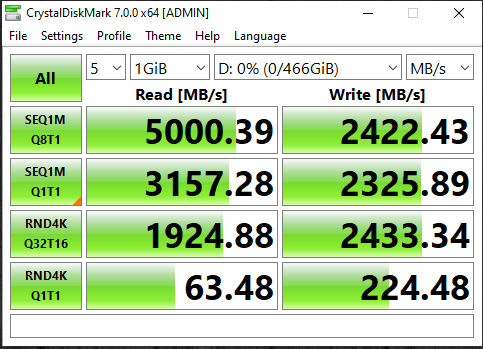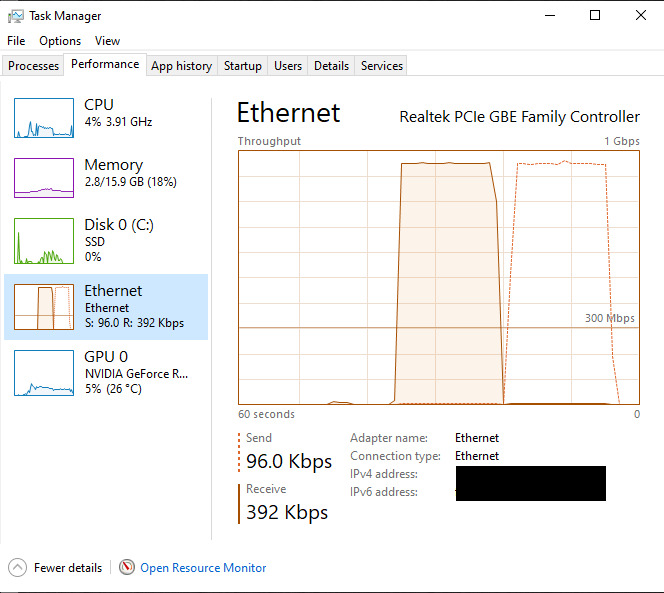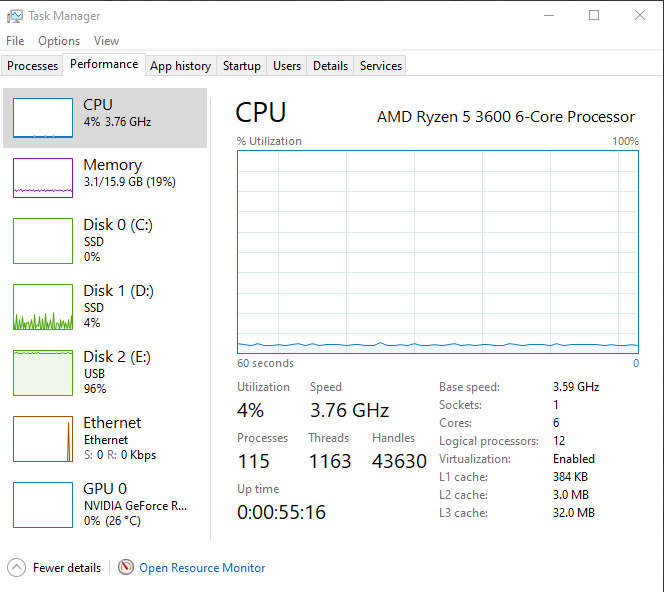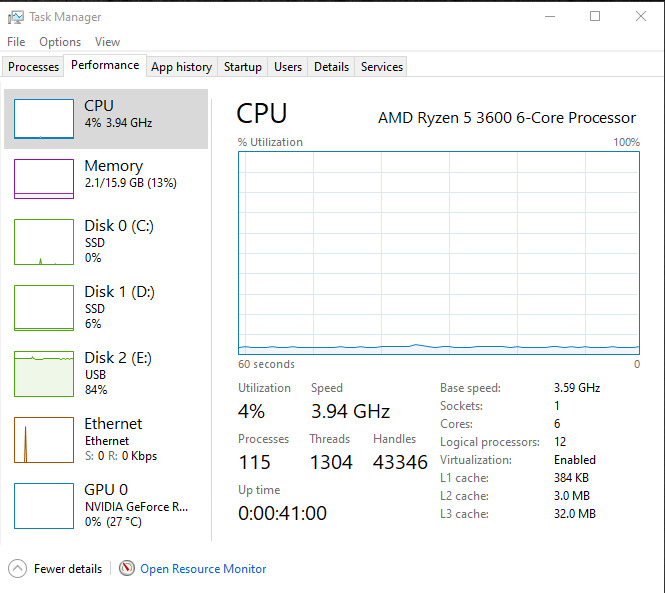Subsystem Testing
DPC Latency
The BIOSTAR B550MH utilizes the Realtek ALC887 7.1 channel, High-Definition Audio, and Hi-Fi Audio Codec.
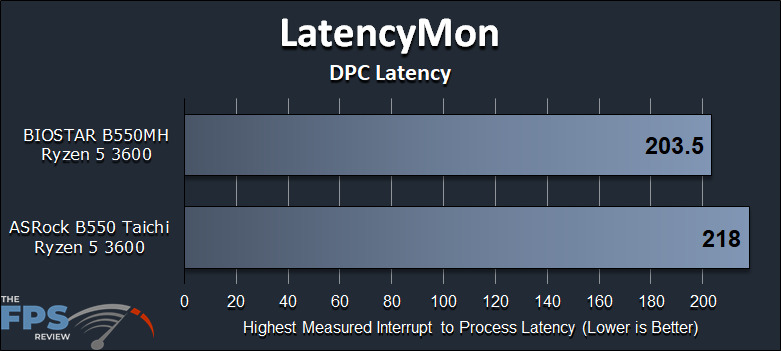
The highest measured interrupt to Process Latency after 10 minutes running was 203.5. This is so far the lowest DPC Latency we’ve encountered with B550 chipset motherboards. The ASRock B550 Taichi had a good DPC Latency of 218, but the BIOSTAR B550MH beats it slightly. This is quite a low number compared to X570 motherboards, which is a good thing. So far B550 chipset motherboards are coming in with very good DPC Latency results in our testing, and this BIOSTAR B550MH has the lowest so far.
SSD Performance
M.2 PCIe 4.0 NVMe Slot
Running in the Primary (only) M.2 PCIe 4 NVMe slot is a SABRENT Rocket 500GB PCI-Express 4.0 NVMe SSD. It has a quoted theoretical speed of 5000 MB/s read and 2500 MB/s write speeds.
CrystalDiskMark is showing that it is reading exactly as it should at its theoretical maximum of 5000 MB/s. Therefore, it is reading with very good performance in all categories. On the write speeds, it is performing slightly under the maximum quoted rated 2500 MB/s speeds here at 2422 MB/s. This may seem like it is close enough, and it probably is, but we want to point out that the ASRock B550 Tachi motherboard had a write speed with this same SSD at 2751 MB/s.
You can also see that all the other write categories save for RND3K Q1T1 was faster on the ASRock B550 motherboard. Interestingly, RND4K Q1T1 is faster on the BIOSTAR B550MH. Basically, the read performance is just fine, but for whatever reason, the write speed is just slightly under that of our other test with this SSD on another B550 board. We will have to test more B550 boards to see what kind of trend continues, or if the ASRock motherboard was just a fluke.
LAN Speed

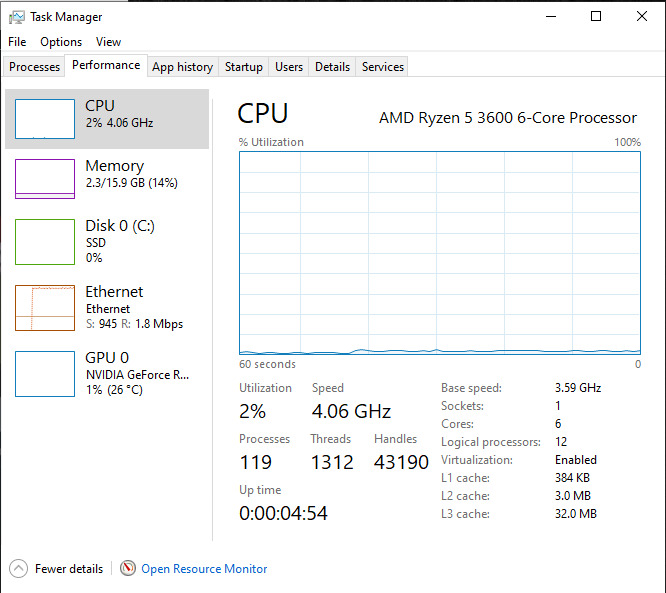
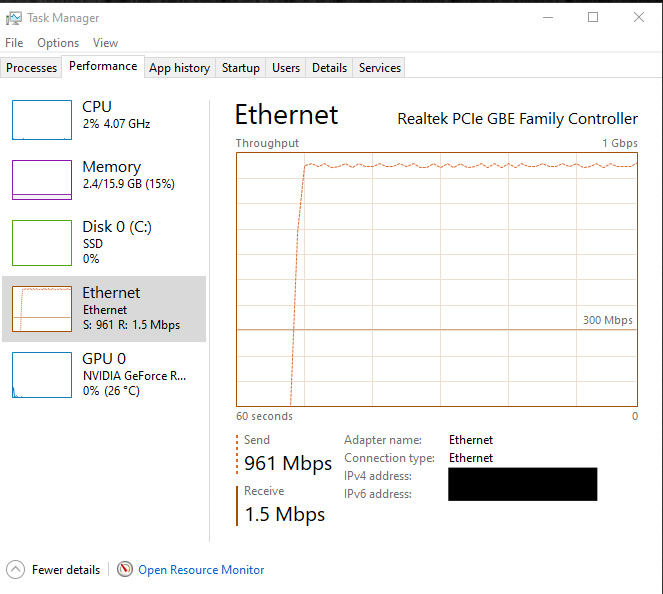
Our local network has a 1 Gigabit connection, and this motherboard also has a Realtek 1 Gigabit ethernet port. According to our LAN test, which streams data across the LAN to another computer we had a maximum speed of 1002 Mbits/s and an average speed of 949.8 Mbits/s. The minimum never dropped below 948.6 Mbits/s. This performance is right where it should be for our network, and exactly matches the ASRock B550 Taichi LAN performance. The CPU utilization while this was going peaked at only 2%. The performance was very consistent.
In this graph above we have also run Speedtest.net to look at the maximum Internet download through the LAN and upload. You can see that both the sending and receiving peaked at 1Gbps, which is our maximum Internet connection speed and LAN network speed.
USB 3.2 Gen 1
We tested reading and writing from and to the USB 3.2 Gen 1 ports to the SABRENT Rocket 500GB PCI-Express 4.0 NVMe SSD on the M.2 PCI-Express 4.0 NVMe slot. We did this with an external NVMe SSD drive using a Samsung 970 EVO Plus 500GB SSD connected via the USB 3.0 Type-A cable. Keep in mind, the theoretical maximum bandwidth of USB 3.2 Gen 1 is 5 Gbits/s or 625 MB/s, but because of overhead, you’ll never get that full performance.
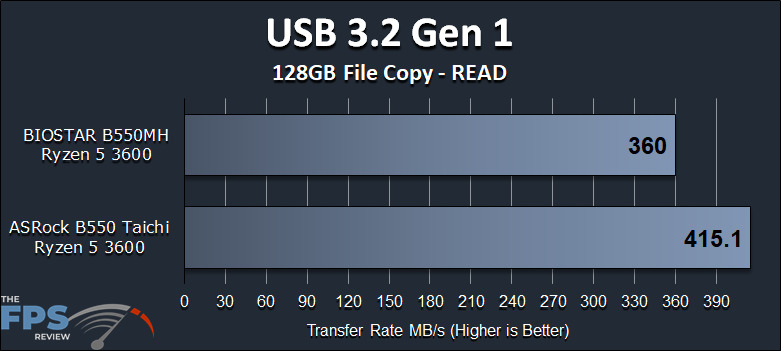
In this test, we are reading from the USB 3.2 Gen 1 port and writing data to the M.2 PCIe 4.0 NVMe SSD. It appears the read performance of the USB port is 360 MB/s, a far cry away from the theoretical maximum of USB 3.2 Gen 1. Even the ASRock B550 Taichi is not as fast at the theoretical maximum of the USB 3.0 ports, but it is 15% faster than the transfer rate on the BIOSTAR B550MH. BTW, we tried all four USB 3 ports on the back on the BIOSTAR motherboard, plus we reversed the SSD configuration just to double-check our results, and they were repeatable and the same every single time.
We also looked at CPU utilization and it used about 4% of the CPU for the whole transfer. You can see here that Disk 2 (E:) is pegged at full percentage reading from the USB port consistently.
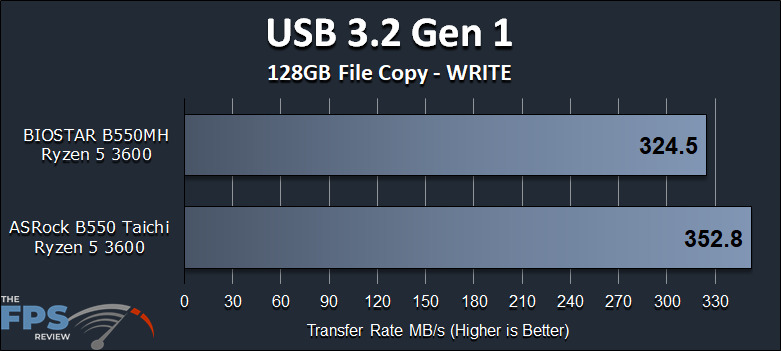
On the writing side of things, this time we are writing the large 128GB file from the M.2 PCIe 4 NVMe SSD to the USB 3.2 Gen 1 USB port on the SAMSUNG 970 EVO Plus SSD. You can see that writing performance is even lower than reading performance. We are getting 324.5MB/s write speeds on the BIOSTAR B550MH versus 352.8MB/s on the ASRock B550 Taichi. The ASRock motherboard is 9% faster. Once again we swapped the SSDs and reversed them to double-check our numbers, and tried every single USB 3 port, and the results were repeatable, and the same.
The CPU utilization while writing was 4%, the same as the read. However, look at this, the Disk 2 (E:) drive, which is the USB 3.0 Port is only maxing out around 85% and not pegging near 100%. This is overhead, this means there is major USB overhead happening here and the full write performance can’t actually be utilized.
USB 2.0
We decided why not also test the USB 2.0 ports, since the USB 3.2 Gen 1 ports were slower than we expected. The theoretical maximum USB 2.0 speed is 480 Mbits/s or 60MB/s.


Both the read and write speed seem to about 42MB/s. This is shy of the 60MB/s 480Mbits/s theoretical maximum performance. This is pretty typical though, because of overhead. On the plus side, the CPU utilization was just 1% and the USB port was pegged at 100% while transferring.

